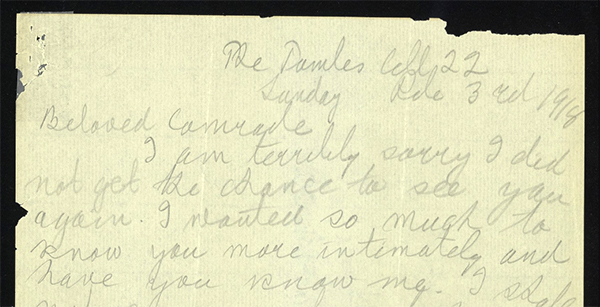
On June 15, 1917, the US Congress passed the Espionage Act, and that same day anarchists Emma Goldman and Alexander Berkman were arrested and sent to prison. The following year, Goldman wrote to Helen Keller from prison. Her penciled letter begins as if she were writing to Helen Keller from her home: “Beloved Comrade I am terribly sorry I did not get the chance to see you again. I wanted so much to know you more intimately and have you know me.”
Emma thanks Helen for her support during her imprisonment and her hope for the future of Russia, calling the country the “Great Miracle.” These famous women had exchanged letters before, sharing poetry and discussing politics.
Goldman’s admiration of Keller is clearly seen in a letter she wrote the previous year: “I want you to know that I am very proud of you, the more so because for twenty-five years I have been searching, searching deligently [sic] to find one truely [sic] big, brave American Woman. Unfortunately I have not discovered very many. You are among the very few.”
Helen Keller’s work, friendships and passions were wide and all-encompassing. She was a humanitarian and animal lover, a writer and political activist. A woman who fiercely defended free speech and an uncensored press. She reveled in knowledge in all its forms.
It should come as no surprise therefore, that she exchanged letters with some of the most important and controversial people of her day -- including Emma Goldman. These two women from vastly different backgrounds found common ground in their political beliefs and respected each other’s differences. In 1931, John Haynes Holmes, prominent Unitarian minister, and co-founder of the NAACP and ACLU included them both in a list of the 10 greatest living women, published in the New York World Telegram.